#native-level Japanese
Explore tagged Tumblr posts
Text
I don't know why I'm putting so much effort into learning two foreign languages when I don't even like talking to people in English.
#japanese language#chinese language#its not like i need to be a native speaker to consume media#and I'll never be at a level of proficiency that would allow me to read historical martial arts texts any better than a translated version
5 notes
·
View notes
Note
I sent you that bit about the Charlie in Japan interview from 1991 but realized I forgot to give you the source! Sorry about that. It’s on YouTube and the channel is futsal1958. Apparently this guy was an interpreter for many English speaking musicians visiting Japan. It’s always nice to hear Charlie speak at length.
youtube
#thanks!#the rolling stones#charlie watts#old married band#ask response#anonymous#youtube#I always admire people who are so good at simultaneous translation#I’ve done it. in more than one circumstance and a variety of languages#but professional interpreters are another level#so talented#especially a native English speaker doing Japanese
4 notes
·
View notes
Text

An. An, beloved, why are you struggling with 珍 of all things. An that is N2 level kanji. An please
#jay rambles.txt#Japanese language levels go in reverse to the European ones#eg A2 is more advanced A1 for Spanish for example but in Japanese it's N1 being more advanced than N2#therefore N2 is the second most advanced word. just around English C1 or high B2#but you are a native speaker An. An you were supposed to learn this word in 7th grade. why are you like this#(<- loves her to death)#I guess there's something freakier than my N5 level mind can understand going on because she literally repeats the same thing while trying#to understand the meaning the kanji she's reading. I think. it's actually written in hiragana but the explanation has the same word in 珍しい#in other words I have given up but she is still silly
9 notes
·
View notes
Text
played my gnoll today in session zero of a campaign Mera is running and especially in Pathfinder it KILLS being a gnoll (kholo) and a rogue/barbarian. I rocked up and almost sliced the biggest enemy in half and proceeded to bite it and another creature's head off within two more turns, it fucked hard
#spiced#we're starting at level five in case you wonder how this is possible#i gave my boy kizzr an odachi and a tetsubo because honestly the idea of a massive hyena man from the desert#using feudal japanese weaponry gets my dick so hard so fast i almost pass out#also his canon voice has an accent that's a mixture of russian and mongolian#i personally can't get my voice to imitate the more deepthroated tones of the accent without tearing my throat to shreds#so it leans more russian but i'm a native english speaker so i'm not beating myself up over it#i was honestly most stoked about using the odachi i feel like it's underutilized but it's SO HUGE AND COOL
2 notes
·
View notes
Text
very specific and very cringe experience: hearing porn in your native language.
#Death by a thousand suns instantly#This is a cringe on a level that leaves nothing behind#I don't know how English native speakers live like this— watch Japanese stuff? 😂 😂 😂 😂 😂#Wow TMI TUESDAY FULL CORE TRADITION HELLO!!!!!!!!!!!!!#buns.txt
6 notes
·
View notes
Text
A few times a year I get the urge to learn basically every language ever and then I give up because I get too ambitious. So my new rule is I’m never allowed to not be learning a language. I have to do at least one language lesson per day for the rest of my life
#i’ve been learning italian since december#i feel like i know greetings and pleasantries really well and i have a decent grasp of pronunciation#(i know a little french and spanish so the sounds aren’t unfamiliar to me)#i can string together basic sentences on a few everyday subjects and would feel confident ordering food or doing basic shopping in italian#i don’t think i could do more than that and would probably fall to pieces if someone said a word i didn’t know#definitely i have no business picking up another language when i’m still so far of where i want to be in italian since i’m not understandin#media i consume in the language; wouldn’t feel able to converse at length in the language etc#so tell me why i picked up greek this past week#i’m trying to prioritise italian so right now i’m just focusing on the greek alphabet and learning to read greek#since i have a really hard time learning new alphabets and i don’t feel comfortable proceeding until i can break down a word and read it#i would say i can recognise the entire greek alphabet but i don’t have all the sounds and names memorised and can’t really read yet#so tell me why i want to pick up welsh#i know bore da. prynhawn da. ellen dw i. draig#i’m 1/4 welsh so i would like to learn at some point#my levels of french and spanish are about the same as my italian but rustier since it’s been a while#i have vague plans of improving them but not any time in the near future#so what i’m thinking is i try to learn 3 languages at once. i mean why not right#people do this. i think?#i saw about this kid whose dad is trying to teach him about a hundred languages and he did a video in some of them#and people were saying most of them were pretty terrible but there were a few (german; japanese; native language of tamil) were pretty good#so that proves you can maybe do this?#idk. girl i’m really high don’t ask me#personal
1 note
·
View note
Text
In light of Duolingo laying off its translators, here are my favourite language apps (primarily for Mandarin Chinese, Japanese, and te reo Māori).
Multiple Languages
Anki is a flashcard programme and app that's not exclusively for languages. While making your own decks is ideal, you can also download shared decks for most languages.
If you're learning Japanese, specifically, Seth Clydesdale has websites for practicing alongside Genki's 2nd or 3rd editions, and he also provides his own shared Anki decks for Genki.
And if you're learning te reo Māori, specifically, here's a guide on how to make your own deck.
TOFU Learn is an app for learning vocabulary that's very similar to Anki. However, it has particularly excellent shared decks for East Asian languages. I've used it extensively for practicing 汉字. Additionally, if you're learning te reo Māori, there's a shared deck of vocabulary from Māori Made Easy!
Mandarin Chinese
Hello Chinese is a fantastic app for people at the HSK 1-4 levels. While there's a paid version, the only thing paying unlocks is access to podcast lessons, which imo are not really necessary. Without paying you still have access to all the gamified lessons which are laid out much like Duolingo's lessons. However, unlike Duolingo, Hello Chinese actually teaches grammar directly, properly teaches 汉字, and includes native audio practice.
Japanese
Renshuu is a website and app for learning and practicing Japanese. The vast majority of its content is available for free. There's also a Discord community where you can practice alongside others.
Kanji Dojo is a free and open source app for learning and practicing the stroke order of kanji. You can learn progressively by JLPT level or by Japanese grades. There's also the option to learn and practice kana stroke order as well.
12K notes
·
View notes
Text
Oh yeah as an English second language speaker, I would say it’s for me probably the easiest of the languages I’ve attempted learning. I think this is because:
1. My native language is Dutch, which is pretty closely related to English. I really think this is the most important factor in whether a language is deemed easy to learn or not.
2. The sheer amount of content that’s available in English. I’ve also had a relatively easy time learning Swedish as it’s also closely related, but it’s way harder to find fun shows to watch, books to read, etc.
3. I personally find English grammar pretty simple, nouns are not gendered, verb conjugations are fairly regular and there are not that many different types (looking at French here) and there are basically no grammatical cases (as opposed to German which is also closely related to Dutch - and I understand a lot of German, but speaking it myself, not so much)
I would say that indeed spelling is the most complicated thing about English, or in my case since I mostly learned through written text, the pronunciation of written words. But like that is something I mess up once or twice and then I know.
I always feel like, "English is so difficult" is just monolinguals trying to feel special, like their language is as hard as walking to school uphill both ways in a snowstorm. Because firstly, every language is equally difficult/easy for babies to learn as a first language (citation: graduate level language development courses). Secondly, lots of languages have messed up writing/spelling systems. And thirdly, learning a language as an adult depends on your first language and the level of similarity. As in, if you know English, Dutch and German (same root) and French (shared vocabulary) are easier to learn as an adult. They have whole language root maps that show you:

The more you learn about other languages, you'll realize they are just as weird as English. Hard to spell stuff in this language? Well according to my colleague who speaks Farsi, they have 4 "z"s, 3 "s"s, and two "t"s that make no sound differences and have to be memorized for spelling because they came from Arabic (citation needed, but the Google seems to back this up). Japanese has three different alphabets. French, Swedish, Faroese, Tibetan, Mongolian and Hebrew also have "deep orthographies" meaning that the relationship between letters and their sounds is less direct than we wish (which may cause a higher incidence of dyslexia), just like English.
English isn't some special language that's so difficult to learn. If it was, I really doubt there would be 750 million second language speakers worldwide. And this isn't just coming from a random internet person, Stephan Pinker, a linguist, has a whole chapter in one of his books about how English grammar is surprisingly regular and we keep making it more regular (eliminating exceptions like "learnt" for "learned") and it's not as weird as people make it out to be.
And yes, I'm aware most people learn English as a second language for economic reasons/colonization/imperialism, but if it was really that hard people would give up. It's just regular hard. Languages are all hard and they all have weirdnesses and histories and English isn't special it's just another language among thousands.
#I think it’s fairly easy to get to a basic level in English because the grammar isn’t that hard#or at least the basic grammar#and it’s easy to learn new vocab through the large amount of English language media#becoming completely fluent and grasp all intricacies is a different story but that first stage I’d say is quite doable#but also my experience is definitely formed most by me being dutch#if my native language had been Japanese it would have been waaaay harder#like all languages I’ve attempted learning are indo European because that’s just way easier for me#part time langblr#English
116 notes
·
View notes
Text
Naming International POC Characters: Do Your Research.
This post is part of a double feature for the same ask. First check out Mod Colette's answer to OP's original question at: A Careful Balance: Portraying a Black Character's Relationship with their Hair. Below are notes on character naming from Mod Rina.
~ ~ ~
@writingraccoon said:
My character is black in a dungeons and dragons-like fantasy world. His name is Kazuki Haile (pronounced hay-lee), and his mother is this world's equivalent of Japanese, which is where his first name is from, while his father is this world's equivalent of Ethiopian, which is where his last name is from. He looks much more like his father, and has hair type 4a. [...]
Hold on a sec.
Haile (pronounced hay-lee), [...] [H]is father is this world’s equivalent of Ethiopian, which is where his last name is from.
OP, where did you get this name? Behindthename.com, perhaps?

Note how it says, “Submitted names are contributed by users of this website. Check marks indicate the level to which a name has been verified.” Do you see any check marks, OP?
What language is this, by the way? If we only count official languages, Ethiopia has 5: Afar, Amharic, Oromo, Somali, & Tigrinya. If we count everything native to that region? Over 90 languages. And I haven't even mentioned the dormant/extinct ones. Do you know which language this name comes from? Have you determined Kazuki’s father’s ethnic group, religion, and language(s)? Do you know just how ethnically diverse Ethiopia is?
~ ~ ~
To All Looking for Character Names on the Internet:
Skip the name aggregators and baby name lists. They often do not cite their sources, even if they’re pulling from credible ones, and often copy each other.
If you still wish to use a name website, find a second source that isn’t a name website.
Find at least one real life individual, living or dead, who has this given name or surname. Try Wikipedia’s lists of notable individuals under "List of [ethnicity] people." You can even try searching Facebook! Pay attention to when these people were born for chronological accuracy/believability.
Make sure you know the language the name comes from, and the ethnicity/culture/religion it’s associated with.
Make sure you understand the naming practices of that culture—how many names, where they come from, name order, and other conventions.
Make sure you have the correct pronunciation of the name. Don’t always trust Wikipedia or American pronunciation guides on Youtube. Try to find a native speaker or language lesson source, or review the phonology & orthography and parse out the string one phoneme at a time.
Suggestions for web sources:
Wikipedia! Look for: “List of [language] [masculine/feminine] given names,” “List of most common [language] family names,” “List of most common surnames in [continent],” and "List of [ethnicity] people."
Census data! Harder to find due to language barriers & what governments make public, but these can really nail period accuracy. This may sound obvious, but look at the year of the character's birth, not the year your story takes place.
Forums and Reddit. No really. Multicultural couples and expats will often ask around for what to name their children. There’s also r/namenerds, where so many folks have shared names in their language that they now have “International Name Threads.” These are all great first-hand sources for name connotations—what’s trendy vs. old-fashioned, preppy vs. nerdy, or classic vs. overused vs. obscure.
~ ~ ~
Luckily for OP, I got very curious and did some research. More on Ethiopian & Eritrean naming, plus mixed/intercultural naming and my recommendations for this character, under the cut. It's really interesting, I promise!
Ethiopian and Eritrean Naming Practices
Haile (IPA: /həjlə/ roughly “hy-luh.” Both a & e are /ə/, a central “uh” sound) is a phrase meaning “power of” in Ge’ez, sometimes known as Classical Ethiopic, which is an extinct/dormant Semitic language that is now used as a liturgical language in Ethiopian churches (think of how Latin & Sanskrit are used today). So it's a religious name, and was likely popularized by the regnal name of the last emperor of Ethiopia, Haile Selassie (“Power of the Trinity”). Ironically, for these reasons it is about as nationalistically “Ethiopian” as a name can get.
Haile is one of the most common “surnames” ever in Ethiopia and Eritrea. Why was that in quotes? Because Ethiopians and Eritreans don’t have surnames. Historically, when they needed to distinguish themselves from others with the same given name, they affixed their father’s given name, and then sometimes their grandfather’s. In modern Ethiopia and Eritrea, their given name is followed by a parent’s (usually father’s) name. First-generation diaspora abroad may solidify this name into a legal “surname” which is then consistently passed down to subsequent generations.
Intercultural Marriages and Naming
This means that Kazuki’s parents will have to figure out if there will be a “surname” going forward, and who it applies to. Your easiest and most likely option is that Kazuki’s dad would have chosen to make his second name (Kazuki’s grandpa’s name) the legal “surname.” The mom would have taken this name upon marriage, and Kazuki would inherit it also. Either moving abroad or the circumstances of the intercultural marriage would have motivated this. Thus “Haile” would be grandpa’s name, and Kazuki wouldn’t be taking his “surname” from his dad. This prevents the mom & Kazuki from having different “surnames.” But you will have to understand and explain where the names came from and the decisions dad made to get there. Otherwise, this will ring culturally hollow and indicate a lack of research.
Typically intercultural parents try to
come up with a first name that is pronounceable in both languages,
go with a name that is the dominant language of where they live, or
compromise and pick one parent’s language, depending on the circumstances.
Option 1 and possibly 3 requires figuring out which language is the father’s first language. Unfortunately, because of the aforementioned national ubiquity of Haile, you will have to start from scratch here and figure out his ethnic group, religion (most are Ethiopian Orthodox and some Sunni Muslim), and language(s).
But then again, writing these characters knowledgeably and respectfully also requires figuring out that information anyway.
~ ~ ~
Names and naming practices are so, so diverse. Do research into the culture and language before picking a name, and never go with only one source.
~ Mod Rina
#asks#language#languages#linguistics#east africa#african#immigration#ethiopian#names#naming#research#resources#writeblr#character names#character name ideas#rina says read under the cut. read it
4K notes
·
View notes
Text
The most common Japanese language proficiency test is called the JLPT. It has 5 levels, with N5 being the most basic and N1 being the highest level. It tests for your reading, listening, and grammar. Most Japanese natives could pass N1 because they'd ace listening and grammar, and reading is considered to be the least priority in everyday life because you don't need the kanji in N1 to buy riceball from 7 11.
Except if you're a Diasomnia stan. N1 is the baseline you need to even be able to grasp the gist of what they're singing.
"He savored the café noir from the demitasse, which filled his heart with superlative pleasure."
Translation: "He enjoyed drinking coffee."
274 notes
·
View notes
Text
Surprise surprise, this translation is wrong
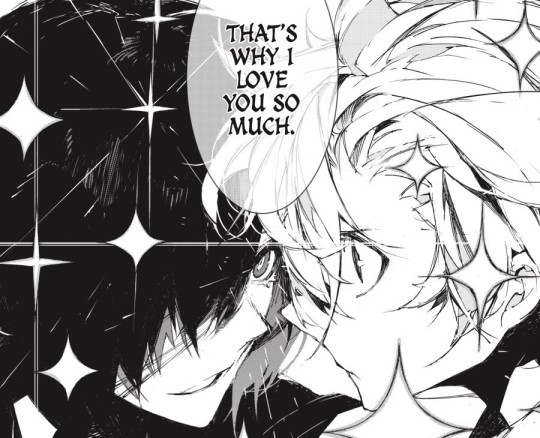
As many of you already know I’m in a crusade against bad translations. I see this panel going around very often but the translation makes me cringe so bad everytime. I'm sure many people are already aware of the mistranslation but I have never seen it explained anywhere so I decided to do it myself.
Disclaimer, English is not my native language.
Let’s start from the previous panel, because ✨context✨ The order is Japanese -- the fan translation I found -- and the official translation.
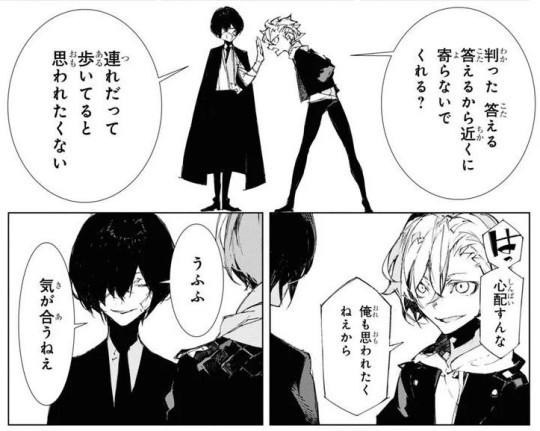
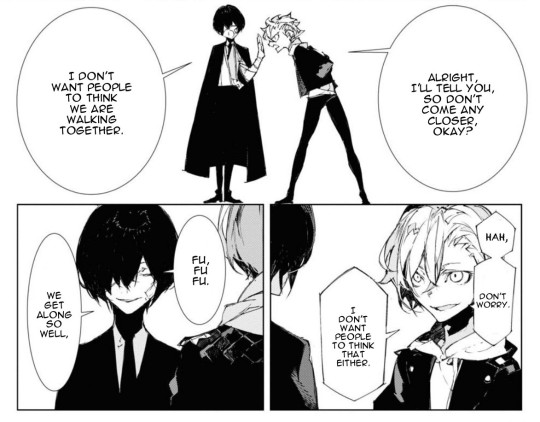
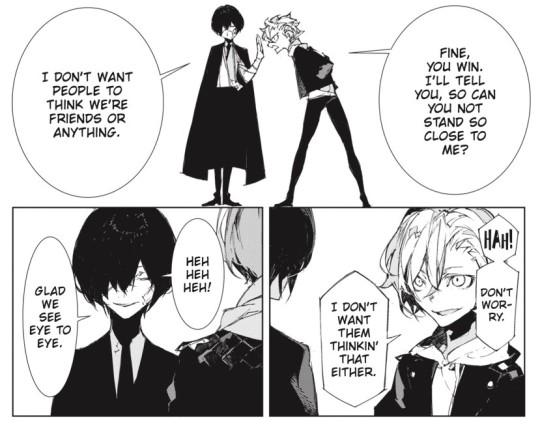
I will write down the literal, weird, almost word for word translation for comparison purposes:
判った 答える 答えるから近くに寄らないでくれる?連れだって歩いてると思われたくない
Understood I’ll answer. I’ll answer so, could you not come any closer? I don’t want it to look like we are walking together (I don’t want it be thought we are walking together)
はっ 心配すんな 俺もおもわれたくねえから
Ha, don’t worry. Because I don’t want it either (I also don’t want it be thought)
うふふ 気が合うねえ
ufufu ki ga au nee
Ok first explanation needed. First, the Japanese definition of ki ga au
気が合う -- 考え方や感じ方が通じ合う (kangaekata ya kanjikata ga tsuujiau)
way of thinking and feeling mutually understood.
"Ki" means mind, spirit, "au" means to meet. The English definition in many dictionaries and google is “to get along” and that’s what the fan translation uses (friendly reminder to ALWAYS use a monolingual dictionary once you reach a level high enough), but the "so well" comes from nowhere. The official translation uses "to see eye to eye". IMO it's more accurate in this context than to get along. But the “glad” also comes from nowhere.
Anyway, now you get the feeling of what it means. I think it's more like Dazai commenting how Chuuya shares with him the same feelings about the situation.
“fufu you agree, I see…”
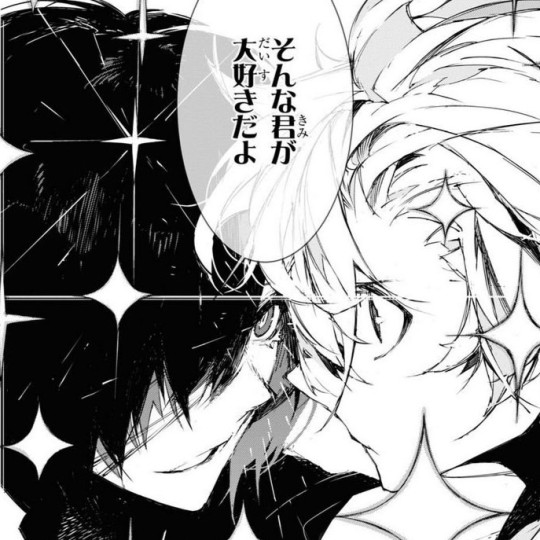
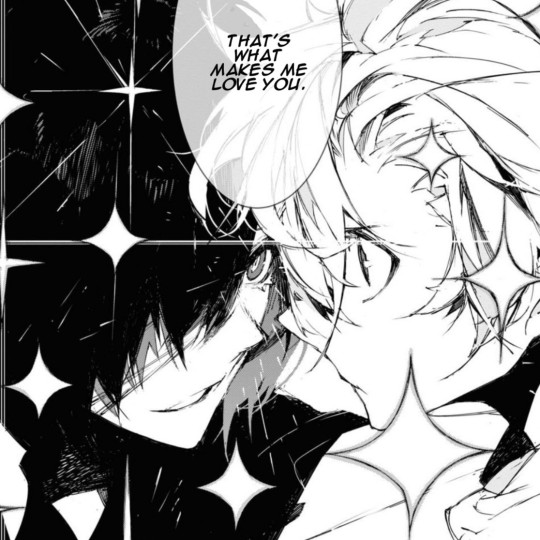
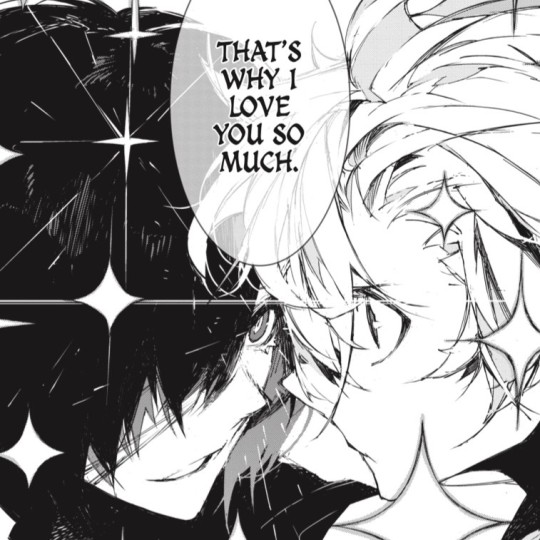
そんな君が大好きだよ
sonna kimi ga daisuki dayo
And we got to the important part.
We have "sonna" that means “such”, “that kind of”. It's a spoken synonym of "sou iu" ("such, like that, that sort of"). As a pre-nominal adjective that goes with kimi, "sonna kimi" it means that you. It has a nuance of surprise when used in sentences like this.
And then "daisukidayo" that of course means I like so much, I love.
What does he loves? "sonna kimi", that is, a specific Chuuya, the Chuuya who is of the same mind that he is about not wanting people to think they were walking together. Or maybe simply the Chuuya that agrees with him, generally speaking.
In both translations the concept is all wrong. It’s presented as if loving Chuuya was the fact and Dazai was explaining the why. But in Japanese, Dazai is singling out the kind of Chuuya he likes/loves if you wish.
Now ask yourselves why specially the official translation chooses to make up the dialogue like that. I'm sure the translators knew enough Japanese to understand it correctly and I don't think it's a matter of cultural adaptation because it never justifies chaging the meaning. The correct answer is fanservice, sales and money 😭
If I had to translate it, I would say “oh I love/like so much that Chuuya!”.
It’s VERY in character for Dazai to say that. And the protest that follows is VERY in character for Chuuya.
うわ……やめろ!気色悪くて死ぬ!
Uwaa… stop it! It’s so disgusting I am going to die!
僕もだ
Me too.
Yes, Dazai sounds crestfallen.
This is getting too long, so my personal non-grammatical opinions under the cut
I have two, even three theories.
First case, Dazai was honest when he said that.
But he didn't register that's not something you go saying around like that, and he was hit with Chuuya's reaction. Because Chuuya had lived with other kids, so he understood social interactions. But Dazai didn't understand.
I've seen infinite analysis about Dazai and ND, mentall illnesses but not even one analyze this scene. So what if he really loved when Chuuya agreed with him, expressed it without any filters and recoiled when he was met with Chuuya's reaction and realized "that was not a normal thing to do". Remember the scene when he shoots the dead soldier? He seemed to be taking notes of what is and isn't normal. This option breaks my heart.
The criticism would be that what Dazai says doesn't sound so honest. This theory would fit better with the English translations but in Japanese he's very clearly informing Chuuya of the kind of Chuuya he likes, which is a twisted thing to say in any language. So maybe Chuuya's reaction is a response to both the nasty observation and the words chosen.
Second option, Dazai knew what he was doing
He used daisuki to provoke Chuuya, to mess with him and make him angry.
That's something 22!Dazai would do easily but I don't know if 15!Dazai was already so good at it. Anyway in this case the surprise would come from the genuine disgust in Chuuya's reaction instead of the expected anger. Chuuya is Chuuya, and he is immune to Dazai's manipulation schemes, except Dazai didn't know it yet. Also once he said it, daisuki was so cringe (and he was 15 😂). Absolutely in character for both of them.
Third option. Dazai said he wanted to make Chuuya his dog.
Dazai was a very messed up kid at that point. The first thing he thinks when he meets another (very powerful) boy his age is to dominate him and make him obbey his orders as his dog. The way he says that to Chuuya can sound very domineering, oh you agree, that's the Chuuya I love. That's a good boy 🐕. And then he felt down when Chuuya rejected that praise with disgust. In the manga it really looks like this option, with a very close and pushing Dazai and an uncomfortable looking Chuuya. I hate that vibe.
Or... possibly it's a bit of all three because after all, nobody knows what's in Dazai's mind 😌
209 notes
·
View notes
Text
Duolingo alternatives
Duolingo’s been in the news for going all AI. Of course, if AI is your bag, that’s cool. But if you’re interested in learning language from resources made by real native speakers and humans…
Here are some suggestions…
Speaking/Listening
-Innovative Language (known for JapanesePod101, koreanclass101, spanishpod101 and their collection of 30+ language programs - teaches languages through conversations (you listen to a convo between two native speakers and then get it explained). Lessons are about 5–10 min on average in audio/video format https://www.innovativelanguage.com/online-language-courses
Pimsleur - similar approach as above but lessons are longer - 30 min and audio only - https://www.pimsleur.com
Reading
LingQ - learn by reading native content and breaking down the words inside. https://www.lingq.com/en/
ReadLang - a browser based tool that translates articles and books you read. https://readlang.com
Satori Reader - (for Japanese) - read level appropriate stories (my fav for reading)
Vocabulary
Anki - not sure if this needs extra explanation - most language learners love Anki’s flash card approach https://apps.ankiweb.net
Clozemaster - learn words in sentence context (instead of just words alone) https://www.clozemaster.com
#learn japanese#japanese#nihongo#japan#katakana#langblr#learn langauge#learn korean#learn spanish#learn French#learn Italian#learn Chinese#ai generated#duolingo#duo
156 notes
·
View notes
Text
Been watching BSD with Japanese audio recently. More specifically, Wan and some of the audio dramas (highly recommend checking these out! This is the playlist I watched.) I find the difference between the way Chuuya and Dazai speak very interesting to me. This may be some base level observations to a native Japanese speaker, but I'd thought I'd share what I noticed. I'm not an expert by any means, so correct me if you see any mistakes!
So, first of all, Chuuya. He has a very masculine and vulgar way of speaking. He refers to himself as "Ore" (俺), which is typically used among teenage boys and is considered masculine and informal. Macho man kind of stuff. On top of that, he rolls his r's a lot, which is also considered very masculine and improper, similar to how a delinquent would talk. I don't necessarily think Chuuya is being overtly manly to the point of toxic masculinity, more so just him trying to be cool and assertive while he was with the Sheep, and then it just kinda stuck. You have to keep in mind that he grew up on the streets, and as the Sheep's leader and protector, it was his job to come across as powerful to keep them safe, so he may have spoke like that to try and intimidate their enemies. Overall, Chuuya's speech is very brash, aggressive, and masculine.
Dazai, on the other hand, is quite formal when he speaks. He refers to himself as "Watashi" (わたし) which is used in formal situations and could be considered slightly feminine. There is something to be said about gender here and how Dazai might identify, but that's another topic for another time. For now, I'm focusing on what this tells us about Dazai's personality, not his gender identity (though I am a huge fan of gender-fuckery Dazai). It's a more passive way of referring to oneself, like Dazai is taking a backseat in the conversation and wanting to seem harmless. Maybe a way of subtly manipulating the situation, maybe he simply doesn't want to exist or be perceived in this world, maybe a bit of both.
Another interesting thing is the way they refer to each other. Chuuya often calls Dazai "Temee" (手前) which is a very vulgar way of saying "you." It could equate to calling someone "bastard." Very, very rude, but that makes sense because Chuuya does NOT like Dazai. He also uses this on other people when they're being idiots, (ahem, Kajii), but it's usually reserved for Dazai. You would definitely never hear him use it for Kouyou, that's for sure. (Whom he calls Ane-san, btw! It's a formal way of saying "big sister," but it's also a common way of referring to a woman of power/ female superior in the mafia).
With Dazai, it's a little more complicated. In Japan, it's considered rude to refer to some as "you" so directly, similar to how it's considered rude to point at someone. So, usually, people will refer to someone as their name with some kind of honorific (-kun or -san, for some examples) that matches their status or by a title. Dazai does this with Kunikida by calling him "Kunikida-kun" or with Fukuzawa by calling him "Shachou" (meaning president in this context).
But with Chuuya, it's simply "Chuuya." Not "Chuuya-san" or even "Chuuya-kun." ("Chuuya-kun" happens a couple times, I believe, but it's rare). Dazai is purposely choosing to leave out any honorific here just to be disrespectful. It's not vulgar by any means like Chuuya's "Temee." Dazai isn't a very vulgar person, as seen by the fact he rarely swears, but he is going out of his way to choose the least polite option for the formal type of speech that he uses. He won't swear at Chuuya, but he will imply that he is somehow not worthy of having an honorific attached to his name when Dazai is speaking to him.
I just thought this was fascinating. Even their way of referring to themselves or others tells you a lot about their personalities. Chuuya isn't afraid to speak his mind, even if it's considered improper or aggressive, and it even gives a nod towards his upbringing on the streets. Dazai, on the other hand, is very purposeful with his language, and every word he uses has meaning. But he also can't resist being a little shit when it comes to Chuuya, doing whatever he can to tease him.
Again, I'm not fluent in Japanese in any way, so if a person who knows a little more about this sees something wrong with what I said, feel free to let me know! Or even add your own observations! I'd love to chat about this.
#this is something I think about often#there is definitely some room here for headcanons and gender fuckery#like Chuuya using such masculine language because he's a trans man#and he's trying to make up for the fact his height makes him dysphoric or something#or Dazai's use of watashi might because he doesn't identify with any particular gender or is gender fluid#the point is that there is a lot you can do with this#This is why I often have Dazai refer to Chuuya in the third person in my fics when speaking to him like “Chuuya is stupid”#It's a nod to the way he refers to him in the orginal dub#bsd#bsd dazai#bsd chuuya#chuuya nakahara#dazai osamu#bungou stray dogs#soukoku#bsd dazai osamu#bsd chuuya nakahara
269 notes
·
View notes
Text
Do you like Kakashi's dogs? Let's talk about why there are eight of them.
another example of naruto's ✨cultural code✨
contents | the eight dog warriors chronicles · legacy · eight confucian virtues. also look at the cuties love them sm
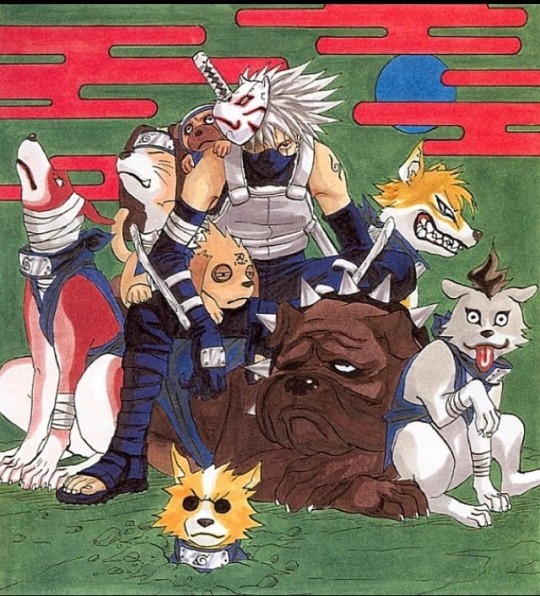
Naruto Vol. 10 CH 90
[ one dog is wonderful, I'm saying as the owner of a sweet little york terrier. two dogs are good, they won't be bored together. three dogs? yeah, cool! how are you going to walk them though? four? yes... look, maybe we have to draw the line h- wha- EIGHT? Excuse Me!? ]
surely, it's worth starting with the fact that eight is a lucky number in Japanese culture — everybody watched Hachi. of course, this is not the only cultural detail where the eight is mentioned. I want to pay special attention to a thing that I didn't know about until I googled it, and this is clearly what Kishimoto was doing homage to with Kakashi's eight ninken.
The Eight Dog Warriors Chronicles
Better known as Nansō Satomi Hakkenden. and it's not just some kind of book, it's a novel, consisting of 106 booklets written by Kyokutei Bakin in XIX century. Hakkenden is considered the largest novel in the history of Japanese Literature. this is one of the main representatives of the gesaku genre, which includes works of a frivolous, joking, silly nature. further I will emphasize a few more times how damn popular this work is and how often it is reflected in culture.
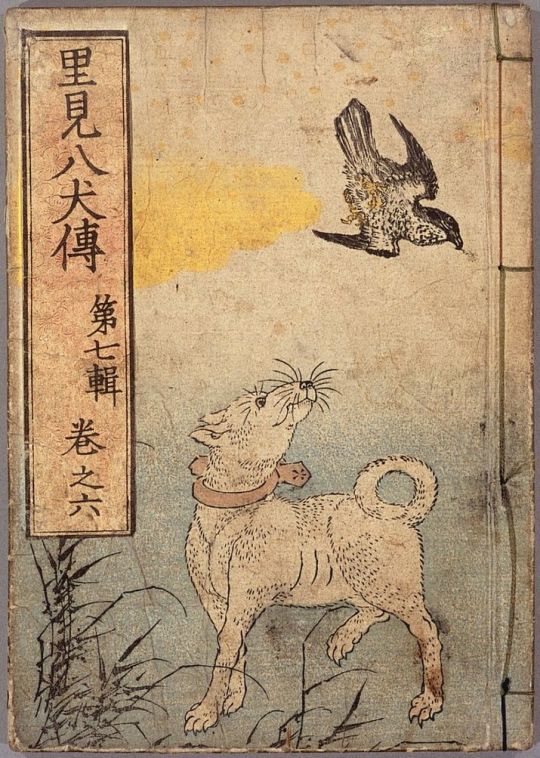
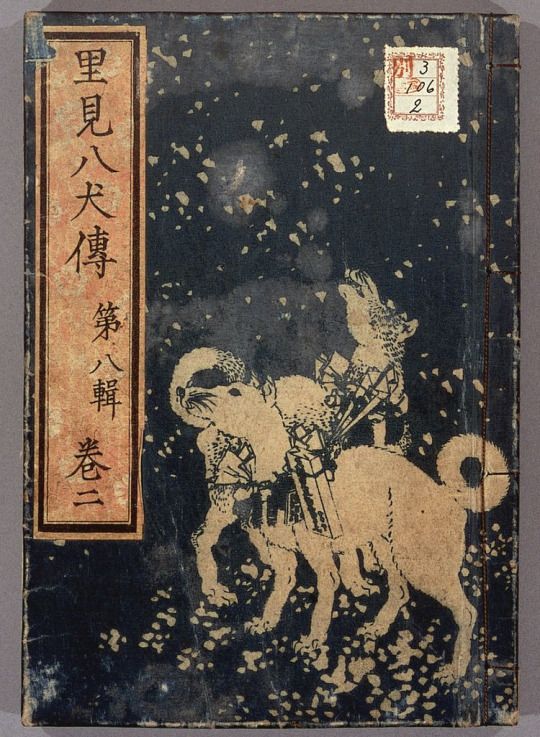
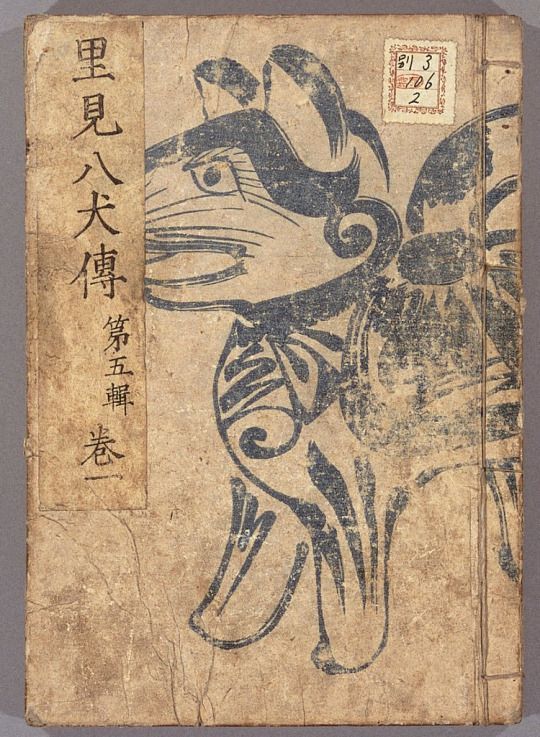
here are some illustrations for these books
now let's talk about the plot. It's weird, but it's weird at samurai-dogs-story level so stay here.
In brief, the story tells about the commander Satomi Yoshizane, whose native lands were attacked by the army of a man, whose forces surpassed those of Satomi, and the samurai in despair swore to a dog named Yatsufusa that the dog would get his beloved daughter Fuse as a wife if he chewed that man's throat. surprisingly, the dog not only understood the owner, but also fulfilled his wish! after that the commander refused to keep the promise. however, Fuse, true to her word of honor, went with Yatsufusa to the mountains and became his wife. upon learning that his daughter was pregnant, Satomi, in a rage, sent a samurai to kill Yatsufusa and bring Fuse home. she stood up for the dog anyways and died with him. at that moment, eight pearls with hieroglyphs that denoted the foundations of Confucian virtue burst out of her womb. (...cheers for mythology, I guess)
Soon, eight dog warriors who were Fuse's spiritual children were born in different parts of Awa province. after going through hardships, they got together and became vassals of the Satomi clan, then won the battle, and soon reached peace.
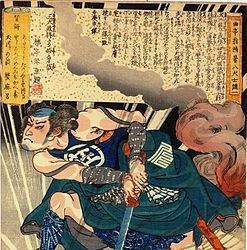
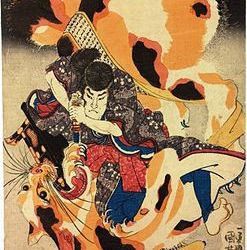
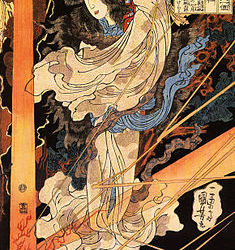
some more illustrations made by Utagawa Kuniyoshi. from left to right: Inukawa Sōsuke (the dog warrior), Inumura Daikaku (the dog warrior), Princess Fuse (their mother).
the novel mainly tells about each individual warrior dog and his shenanigans in a funny adventurous way. huge fame has led to excerpts from Hakkenden being staged at the Kabuki Theater and mentioned in the anime and manga, such as Inuyasha, Dragon Ball, as it turned out, Naruto and so on. there's also a lot of films and video games.
The eight virtues
these are loyalty, filial piety, benevolence, love, honesty, justice, harmony, and peace.
they relate more to Chinese culture, but basically Hakkenden was inspired by it too. since I did not read the whole novel, I would still like to mention at least the values on which it is based, and which were embedded in the symbolism of this story. It's quite interesting to apply this to Kakashi's dogs. gives them more weight and depth.
It is also interesting to note that the reason why Fuse gave birth to dogs was also that her father was cursed earlier in the story in a way that his descendants would become depraved like dogs. in Japanese culture, dogs embody the duality of character: the same mentioned filth and depravity, and devotion and bravery. so as samurai. but this is a different conversation, more related to Kakashi and his dog poetry.
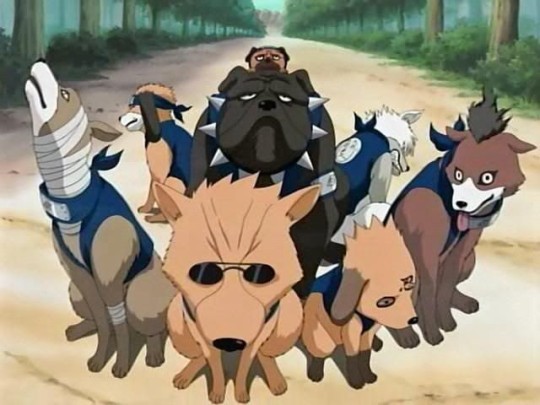
Did you get here? Here's an additional discovery for you✨
Pakkun's name (パックン) is derived from the Japanese onomatopoeia “pakupaku” (パクパク) which reflects the sound of munching.
Kakashi, that's very sweet of you.
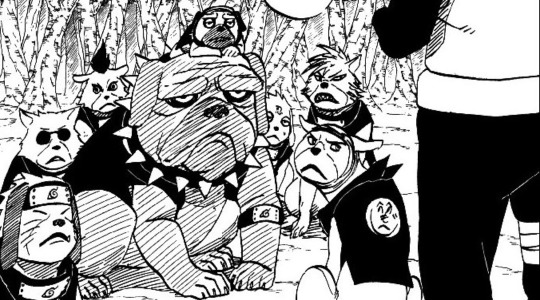
thank you for reading this to the end ♡
809 notes
·
View notes
Text
What Languages the Earthrealmers speak + level of fluency
JOHNNY
English [100% it’s his native language]
German [100% he has no modern German ancestors he took it initially in high school and just really enjoyed learning it]
ASL [89% still learning, started learning bc he wanted to connect with more fans after encounter a fan who he couldn’t understand on the streets, because they used sign language. He was so upset he went home and started sign language lessons that day. If Johnny loves one thing it’s his fans]
KENSHI
Japanese [100% its either his native language or something he learned alongside English]
English [80% nobody believed he wasn’t fluent until he forgot the word for bird and called it a ‘feathered plane’]
Chinese [52% Raiden is teaching him, he’s enjoying the lessons]
KUNG LAO
Chinese [100% its his native language]
English [87% had English classes in school, didn’t pay attention but enjoyed learning it out of school]
RAIDEN
Chinese [100% its his native language]
English [89% he’s good just..weirdly formal at times when it isn’t required. He blames the English classes he took in school]
BONUS! LIU KANG
Hes god so…all of them?? Or he could understand them?? Also probably speaks in an older version of certain languages like Chinese (since originally he was just a Chinese monk)
#tarnishedsilverjewelry#mk1 x reader#mortal kombat 1#kung lao#mk1 kung lao#mortal kombat kung lao#rain mk1#mk1 raiden#raiden mortal kombat 1#raiden#kenshi mortal kombat#kenshi takahashi#kenshi mk1#god liu kang#liu kang mk1#liu kang#mk1 liu kang#mk1 johnny cage#mk johnny cage#johnny cage mk1#mortal kombat johnny cage#johnny cage
159 notes
·
View notes
Note
RIDDLE DREAM SPOILER‼️‼️‼️
Lmao, why is his dream just...
"Quit your job"
"Why?"
"Join my emo band!"
(No but honestly, its a bit cute that, Riddle, in all his seriousness and rules sticking, still seemed to choose a more alt way to dress in his dream, like he still wants to rebel in some way. It was a plot twist in a way since many may have thought that Riddle would have cranked up on his authoritarian ways all the way to eleven, and yet his dream is silly, like all the other house warden's dreams seemed to be more serious in a way and showed off one aspect that we knew off, Leona's low self esteem and Azul wanting to completly overwrite his past, but Riddle wasn't quite that, we knew of his want for rebelion, but his dream wasn't full anarchy, it was just... rebelling in the small ways)
(Sorry for any misspelling, english isn't my native lenguage)
[You can read my thoughts on the book 7 chapter 12 part 3 update here!]

I just saw that meme on Twitter with Riddle and Cater 😭
I was shocked by Riddle’s new look in the dream… It’s close to alt fashion in the west, but I believe it is supposed to be Japanese visual kei. All that black… I don’t know, I don’t think dark eye and lip makeup suits him?? But that’s just me, what do I know about style www

I’m surprised Riddle even knows what that kind of clothing is…? You’d think his mom would not allow him to be exposed to this kind of fashion. I was half expecting Cater to mention he had shared it with Riddle at NRC on a slow day and Riddle expressing a little curiosity about it but ultimately holding himself back from dressing adventurously. That never ended up happening…
I do think that an authoritarian dream has its representation in the second and third layers of Riddle’s mind. The darker implication is certainly there. However, I think it makes the most sense for his surface level dream to be about his childish desires and experiences he never had. As much as Riddle might claim to be mature and to know it all, some part of him desperately misses out on happy childhood memories. He shares this sentiment after recovering from his overblot (“And after a meal, I want to be the one sitting around talking with everyone... And I really wanted to play with you and Chenya more, Trey.”). In events like Endless Halloween Night, Riddle tells his peers that he isn’t familiar with traditional entertainment media like movies or video games; he did crosswords and read textbooks as a child. Various voice lines, like his Suitor Suit, where he wishes his parents’ marriage was happy, or his Beachwear, where he complains about how he is not used to this kind of scandalous clothing, also express this.
I wouldn’t describe Riddle’s dream as an expression of him wanting to rebel or to have anarchy, per se. Wanting more freedom and a longing for a chance to express one’s inner child isn’t necessarily equal to being rebellious. Many of the things he desires are very childish: not wanting to go to school or to study, eating desserts multiple times a week, drinking tea sweet, being able to play all day, always having emotionally available parents, not having to follow rules, having many friends and a happy family… These are not all tied to being rebellious, these are things most children want. It speaks to Riddle wanting to have those childhood experiences he missed out on and having more independence… Being allowed to be his own person rather than a puppet on strings his mother controls and makes all the decisions for.
#twisted wonderland#twst#disney twisted wonderland#disney twst#Riddle Rosehearts#Cater Diamond#notes from the writing raven#jp spoilers#book 7 chapter 12 part 3 spoilers#book 1 spoilers
176 notes
·
View notes